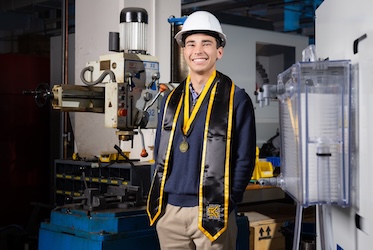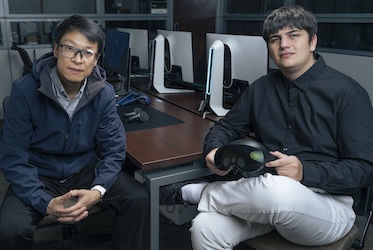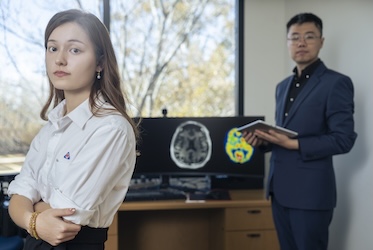

KENNESAW, Ga. | Jun 25, 2020

Under normal circumstances, Kennesaw State University students and staff would have physical access to the latest in virtual reality technology in the University’s Games User Interaction Tangible Animations & Realities (G.U.I.T.A.R.) lab.
However, with the rapid spread of the coronavirus pandemic, industry projects handled
by the College of Computing and Software Engineering (CCSE) were challenged with shifting to a remote setting without access to valuable
lab space. To counter this, the College recently expanded its resource offering to
a team of professional and student VR developers completing an industry project, allowing
them to use the equipment remotely.
The team, led by CCSE VR software developer Jaylin Gillam, had been completing the
third and final phase of the Hazard Elimination/Risk Oversight (HERO) program, a VR
training tool conceived by leading architecture, engineering and construction firm
Haskell and fine-tuned by Gillam and his student assistants Matthew Lamneck, Bonga
Maswanganye, Michael Revit and Thomas Pereira. In the second phase of the project,
a KSU team built a deliverable version of the program for Haskell to test among its employees. In the third iteration, the University was tasked with porting the software over to a more cost-effective and portable standalone VR headset while improving the program’s scoring functions.

Without access to lab space, Gillam said, the G.U.I.T.A.R. lab supplied each of the students with high-powered gaming laptops capable of running the development programs used to build the HERO training tool. CCSE also upgraded the team’s Unity game design software package to include a collaboration function, allowing team members to make improvements remotely and immediately send them to the others for testing, and ordered additional Oculus Quest VR headsets for each of the students to take home while completing the project.
The third phase of the project was completed and submitted to Dysruptek, the corporate venture arm of Haskell tasked with developing emerging construction technologies in June.
“Despite the technical challenges at the beginning, I’m extremely proud of our ability to push through a difficult situation in order to complete the project,” Gillam said. “Our team proved how flexible they can be in the remote setting and, in return, they gained valuable work experience that will guide them once they enter the field full time.”
Lamneck, an art illustration and computer game design and development double major, said the shift to remote work taught him a lot about efficiency and accountability. Having completed several other projects while working as a student assistant in the G.U.I.T.A.R. lab, he missed the ability to interact with teammates face-to-face. Throughout the three-month project, the team stayed connected by chatting daily on Discord and meeting over video calls to discuss progress.
“We are very fortunate to be in a field that is very technology heavy,” Lamneck said. “Working remote certainly creates a different dynamic that doesn’t quite replace in-person interaction, but I think we all showed resolve by taking advantage of our resources to finish the HERO program.”
Maswanganye, who was completing his first project with the lab under the Federal Work-Study Program, said the process was eye-opening.
“I definitely have a newfound respect for people who do this as a career, and I feel like I have a lot more room for growth as I continue to take on new projects,” he said.
– Travis Highfield
Photo submitted

Discipline and determination drive track and classroom success for graduating student-athlete

Student, faculty researchers explore how AI can improve STEM learning through virtual reality

Student, faculty researchers use AI to improve early detection and diagnosis of Alzheimer's disease

Kennesaw State researchers use drones, artificial intelligence to improve disaster response
A leader in innovative teaching and learning, Kennesaw State University offers undergraduate, graduate, and doctoral degrees to its more than 51,000 students. Kennesaw State is a member of the University System of Georgia with 11 academic colleges. The university's vibrant campus culture, diverse population, strong global ties, and entrepreneurial spirit draw students from throughout the country and the world. Kennesaw State is a Carnegie-designated doctoral research institution (R2), placing it among an elite group of only 8 percent of U.S. colleges and universities with an R1 or R2 status. For more information, visit kennesaw.edu.